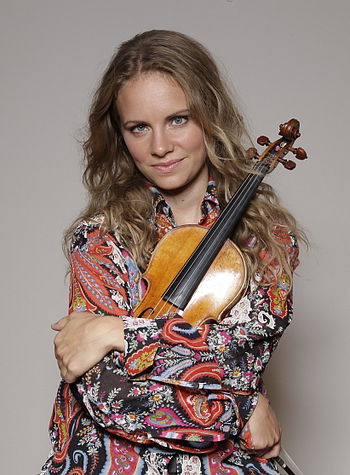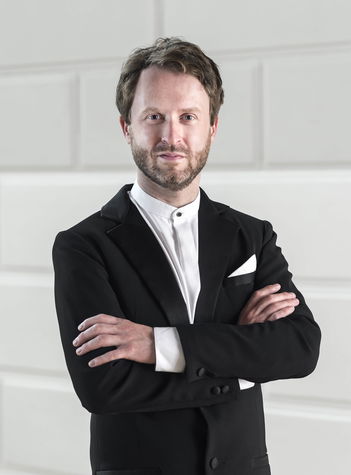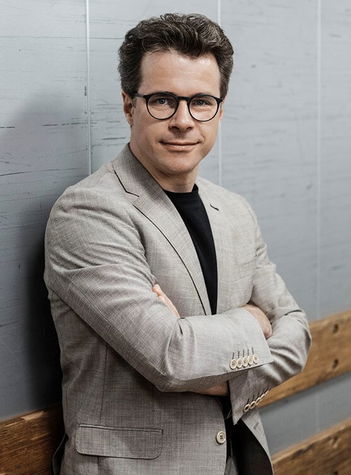Programme
Antonín Dvořák
Carnival Overture, Op. 92
Josef Suk
Fantasy in G minor for violin and orchestra, Op. 24
Leoš Janáček
Glagolitic Mass, cantata for vocal soloists, choir, orchestra and organ to an Old Church Slavonic text
Secure your seat for the 2025/2026 season – presales are open.
Choose SubscriptionThe concert is one of the programme pillars of the celebration of the current Year of Czech Music. It includes - with the exception of Bedřich Smetana and Bohuslav Martinů, who will be given their place at other concerts of this year's festival - compositions by the world's most renowned Czech composers whose works have become part of the constant repertoire.
Duration of the programme 2 hours
Antonín Dvořák
Carnival Overture, Op. 92
Josef Suk
Fantasy in G minor for violin and orchestra, Op. 24
Leoš Janáček
Glagolitic Mass, cantata for vocal soloists, choir, orchestra and organ to an Old Church Slavonic text
Julia Fischer violin
Corinne Winters soprano
Bella Adamova alto
David Butt Philip tenor
Brindley Sherratt bass
Christian Schmitt organ
Prague Philharmonic Choir
Lukáš Vasilek choirmaster
Jakub Hrůša conductor
Czech Philharmonic

Julia Fischer violin

Julia Fischer is one of today’s most prominent violinists. Her career journey has been recorded on many CDs and DVDs on the Pentatone and Decca labels and recently also on her own musical platform JF CLUB. She has been honoured with such prestigious prizes as the Order of Merit of the Federal Republic of Germany and a Gramophone Award.
She was born in 1983 in Munich to German and Slovak parents who are said to have met while studying in Prague. She began playing the violin at age three, and she soon took up the piano as well under the guidance of her mother Viera Fischer. At just nine years of age, she enrolled at the university in Munich as a student of the renowned pedagogue Ana Chumachenco, whom Fischer later succeeded in that teaching position. A major milestone was her victory at the prestigious Yehudi Menuhin International Competition in 1995 (at just 12 years of age!), launching her worldwide fame. Since then, we have been seeing her regularly on the world’s most famous stages, whether collaborating with major orchestras and such conductors as Herbert Blomstedt, Christian Thielemann, Juanjo Mena, Riccardo Muti, and Franz Welser-Möst, or giving solo or chamber music recitals. Besides the traditional repertoire, she also devotes herself to contemporary music, as is shown by the scheduled March world premiere of a violin concerto by Daniel Kidane with the London Philharmonic and Edward Gardner.
In addition, Julia Fischer is planning several European tours this year including appearances with the Academy of St Martin in the Fields, the Royal Philharmonic, her quartet (the Julia Fischer Quartet), and the pianist Yulianna Avdeeva. She is going to Athens (4 Dec.) and Vienna (6 Dec.), and before arriving in Prague, we also find her playing a concert with the Royal Stockholm Philharmonic and Esa-Pekka Salonen for the occasion of the awarding of a Nobel Prize (8 Dec.). She and Avdeeva have been a seasoned duo for several years although, as Julia Fischer reveals, their meeting had been arranged: “We had musical friends in common who wanted to get us together no matter what. They were convinced that we were suited to each other. And that finally came about in 2012. What more is there to say? They were right.” The Prague public was already able to witness how well these two extraordinary women play together in 2018, when they appeared together at the Municipal House’s Smetana Hall.
Not satisfied “just” with the career of a world-famous violinist, Julia Fischer is taking advantage of her musical versatility. She will be revealing to the Prague public the quality of the aforementioned Julia Fischer Quartet as part of her residency in November (concert I2), and those who want proof of her pianistic ability can enjoy the DVD recording of her successful concert at the Alte Oper in Frankfurt in 2010, when she appeared on the first half of the programme as the soloist in a violin concerto by Saint-Saëns, then on the second half playing Grieg’s Piano Concerto. Besides performing, she also devotes herself to music pedagogy, with teaching activities that include leading numerous masterclasses. She joined with Johannes X. Schachter and Henri Bonamy in founding the Kindersinfoniker youth orchestra. Next year she will also become the artistic director of the Boswil Summer Festival in Switzerland.
Corinne Winters soprano
Bella Adamova alto
David Butt Philip tenor
Brindley Sherratt bass
Christian Schmitt organ
Prague Philharmonic Choir
The Prague Philharmonic Choir (PPC), founded in 1935 by the choirmaster Jan Kühn, is the oldest professional mixed choir in the Czech Republic. Their current choirmaster and artistic director is Lukáš Vasilek, and the second choirmaster is Lukáš Kozubík.
The choir has earned the highest acclaim in the oratorio and cantata repertoire, performing with the world’s most famous orchestras. In this country, they collaborate regularly with the Czech Philharmonic and the Prague Philharmonia. They also perform opera as the choir-in-residence of the opera festival in Bregenz, Austria.
Programmes focusing mainly on difficult, lesser-known works of the choral repertoire. For voice students, they are organising the Academy of Choral Singing, and for young children there is a cycle of educational concerts.
The choir has been honoured with the 2018 Classic Prague Award and the 2022 Antonín Dvořák Prize.
Lukáš Vasilek choirmaster

Lukáš Vasilek studied conducting and musicology. Since 2007, he has been the chief choirmaster of the Prague Philharmonic Choir (PPC). Most of his artistic work with the choir consists of rehearsing and performing the a cappella repertoire and preparing the choir to perform in large-scale cantatas, oratorios, and operatic projects, during which he collaborates with world-famous conductors and orchestras (such as the Berlin Philharmonic, the Czech Philharmonic, the Israel Philharmonic, and the Saint Petersburg Philharmonic).
Besides leading the PPC, he also engages in other artistic activities, especially in collaboration with the vocal ensemble Martinů Voices, which he founded in 2010. As a conductor or choirmaster, his name appears on a large number of recordings that the PPC have made for important international labels (Decca Classics, Supraphon); in recent years, he has been devoting himself systematically to the recording of Bohuslav Martinů’s choral music. His recordings have received extraordinary acclaim abroad and have earned honours including awards from the prestigious journals Gramophone, BBC Music Magazine, and Diapason.
Jakub Hrůša principal guest conductor

Born in the Czech Republic, Jakub Hrůša is Chief Conductor of the Bamberg Symphony, Music Director Designate of the Royal Opera, Covent Garden (Music Director from 2025), and Principal Guest Conductor of the Czech Philharmonic. He was also formerly Principal Guest Conductor of the Orchestra dell’Accademia Nazionale di Santa Cecilia, the Philharmonia Orchestra, and Tokyo Metropolitan Symphony Orchestra.
He is a frequent guest with the world’s greatest orchestras, including the Vienna, Berlin, Munich and New York Philharmonics; Bavarian Radio, NHK, Chicago and Boston Symphonies; Leipzig Gewandhaus, Lucerne Festival, Royal Concertgebouw, Mahler Chamber and The Cleveland Orchestras; Orchestre Philharmonique de Radio France, and Tonhalle Orchester Zürich. He has led opera productions for the Salzburg Festival (Káťa Kabanová with the Vienna Philharmonic in 2022), Vienna State Opera, Royal Opera House, and Opéra National de Paris. He has also been a regular guest with Glyndebourne Festival and served as Music Director of Glyndebourne On Tour for three years.
His relationships with leading vocal and instrumental soloists have included collaborations in recent seasons with Daniil Trifonov, Mitsuko Uchida, Hélène Grimaud, Behzod Abduraimov, Anne Sofie Mutter, Lisa Batiashvili, Joshua Bell, Yefim Bronfman, Rudolf Buchbinder, Gautier Capuçon, Julia Fischer, Sol Gabetta, Hilary Hahn, Janine Jansen, Karita Mattila, Leonidas Kavakos, Lang Lang, Josef Špaček, Jean-Yves Thibaudet, Yuja Wang, Frank Peter Zimmermann, Alisa Weilerstein and others.
As a recording artist, Jakub Hrůša has received numerous awards and nominations for his discography. Most recently, he received the Opus Klassik Conductor of the Year 2023 prize and the ICMA prize for Symphonic Music for his recording of Bruckner’s Symphony No. 4, and the Preis der Deutschen Schallplattenkritik for his recording of Mahler’s Symphony No. 4, both with Bamberg Symphony. In 2021, his disc of Martinů and Bartók violin concertos with Bamberg Symphony and Frank Peter Zimmermann was nominated for BBC Music Magazine and Gramophone awards, and his recording of the Dvořák Violin Concerto with the Bavarian Radio Symphony and Augustin Hadelich was nominated for a Grammy Award.
Jakub Hrůša studied at the Academy of Performing Arts in Prague, where his teachers included Jiří Bělohlávek. He is President of the International Martinů Circle and The Dvořák Society. He was the inaugural recipient of the Sir Charles Mackerras Prize, and in 2020 was awarded both the Antonín Dvořák Prize by the Czech Republic’s Academy of Classical Music, and – together with Bamberg Symphony – the Bavarian State Prize for Music.
Antonín Dvořák
Carnival Overture, Op. 92
“Whatever we have in Czech history that is truly great has grown from the bottom up!” This sentence by the famous Czech author Jan Neruda tells us a great deal about the history of the Czech nation and its great figures. It certainly applies unreservedly to Antonín Dvořák, whose growing artistry took him from a little village to the world’s greatest metropolises.
When Neruda wrote these words in 1884, he was 50 years old. And what was Antonín Dvořák doing in 1891 at age 50? He was a famous, sought-after composer, an artist whose popularity had long since crossed the borders of Austria-Hungary and spread all over Europe. It was in the year of his 50th birthday that he was offered the directorship of the National Conservatory of Music in New York. He considered the matter very carefully, consulting with many of the people who were close to him. For example, he wrote to his friend Alois Göbl in June 1891: “I’m supposed to go to America for two years! […] Should I accept the offer? Or not? Send me word.” Dvořák had never been very fond of celebrations, so it is no surprise that in early September he refused to take part in celebrations in Prague for his 50th birthday because he was spending time with his family at his beloved summer home in Vysoká, where he went to rest and to compose. Four days after his birthday (12 September 1891), he finished orchestrating Carnival Overture, Op. 92, the second work in a cycle of three concert overtures that are programmatic in character. We do not have a concrete programme from the composer, but he clearly realised something here that no one would have expected from him in the realm of symphonic music. Two years earlier, he had already gone down this path in chamber music with his Poetic Tone Pictures, Op. 85, thirteen pieces for solo piano, about which he jokingly commented: “I’m not just an absolute musician, but also a poet.” Dvořák had originally conceived his triptych of concert overtures depicting three aspects of human life as a single whole with the title “Nature, Life, and Love”. All three overtures are also carefully motivically interconnected. Ultimately, however, the composer told his publisher Simrock that his overtures “each can also be played separately”, and he gave them the opus numbers and titles In Nature’s Realm, Op. 91, Carnival Overture, Op. 92, and Othello, Op. 93. The first performance of all three overtures took place on 28 April 1892 at the Rudolfinum in Prague at the composer’s farewell concert before his departure for America, with Dvořák himself conducting the orchestra of the National Theatre. Dvořák also conducted their second performance, this time across the ocean on 21 October 1892 at New York’s Carnegie Hall.
Josef Suk
Fantasy in G minor for violin and orchestra, Op. 24
Josef Suk’s single-movement Fantasy in G minor for violin and orchestra, Op. 24 represents the composer’s original solution for the form of the violin concerto. The solo part does not play a dominating role in the work; the violin and orchestra are equal partners. The work’s designation as a fantasy corresponds to its relaxed structure, which nonetheless preserves the outlines of sonata form. The composition was first heard on 9 January 1904 with the Czech Philharmonic led by Oskar Nedbal. The soloist was Karel Hoffmann, the first violinist of the Bohemian Quartet (later called the Czech Quartet). Another important performance occurred on 30 May 1908 at the Jubilee Exhibition of the Prague Chamber of Commerce and Trade. On that occasion, Vilém Zemánek led the expanded forces of the Czech Philharmonic, and the soloist was František Ondříček. The reviews were excellent, and Suk’s new work soon made its way beyond the borders of his homeland. Right from the start, the work was taken up by a leading violinist of the day, Carl Flesch, who performed the Fantasy under the baton of Arthur Nikisch on 18 December 1911 in Berlin and shortly thereafter in London with the conductor Sir Henry Wood. After a performance of the work in Vienna on 12 November 1913 by the orchestra of the Musikverein with the conductor Carl Loewe, again with Carl Flesch as the soloist, a critic wrote that “there is no need to lament that the composing of concertante works for violin is in decline” as long as there are works in existence like this one by Suk. “Suk’s Fantasy is an important symphonic composition, rich in melody, a work that must cause the pulse of any conductor to race, yet at the same time it is a wonderful opportunity for an outstanding violinist.”
Leoš Janáček
Glagolitic Mass, a cantata for soloists, choir, orchestra and organ
Among great creative figures, Leoš Janáček is remarkable in that the older he got, the more “youthful”, original, and modern the music that he wrote became. This was perhaps because he had lost everything. Released by the cruelty of fate from his ties and concerns for his parents and his children, he was truly able to find himself. He cast aside conventions and tried to get to the heart of things.
Janáček’s Glagolitic Mass is one of the most powerful sacred compositions in music history. The 72-year-old composer wrote the music to the text in Old Church Slavonic in 1926 at his favourite spa, Luhačovice. “The rain in Luhačovice is pouring, just pouring. I look out of the window at the gloomy mountain Komoň. The clouds come rolling in, and the wind tears and scatters them. […] The darkness becomes denser and denser. Now I look out into the black of night; lightning slashes into the darkness.” That is how Janáček described the atmosphere that August, when he began writing his Glagolitic Mass. The decision was made quickly. Although he had taken an interest in the Old Church Slavonic text of the Mass a few years beforehand and had made a few sketches, the music that he ultimately began writing in Luhačovice had nothing in common with those sketches. For Janáček, starting the new work was quite emotional. His ideas had to mature, but once creative fervour had taken hold, he composed quickly. He sketched out the entire Mass in just three weeks! By October 1926, he had finished it. He made more quite substantial changes after the premiere, which took place on 5 December 1927 in Brno. Janáček was able to make cuts. He is never verbose; he is precise.
For example, in the movement “Věruju” (Credo) he shortened the orchestral interlude that contained a very powerful passage inducing the atmosphere before the choir begins singing about Christ’s crucifixion. Janáček originally scored this harsh passage for three (!) sets of tympani, and he combined them with expressive music for brass and organ. In a letter to Kamila Stösslová he wrote: “…so I’m doing a bit of a depiction of the legend that when Christ was stretched out on the cross, the heavens were torn. So I wrote rumbling and lightning…” His wife Zdena supposedly told him: “Leoš, that’s impossible; you’re cursing at the Lord God there.” And a while later Janáček said: “So I’ve gotten rid of the tympani there…”
Although the Glagolitic Mass is a musical setting of a liturgical text, the work is not confessional in character. To Ludvík Kundera’s review, in which he called the composer an “old man” and a “firm believer”, Janáček’s reply was “No old man, no believer, you youngster”. This is often quoted, but we must take it with a grain of salt. Janáček was unquestionably a spiritual person. He was raised in the environment of the church at the Benedictine Monastery in Old Brno. However, he was not a practicing Catholic. We know only that he brought his children up in faith and prayer. He apparently felt distanced from the Catholic Church, so he was attracted to the idea of writing a Mass, but to the Old Church Slavonic text.